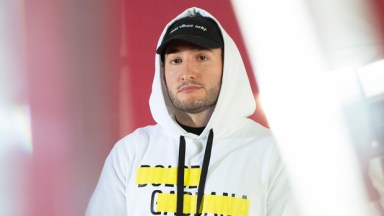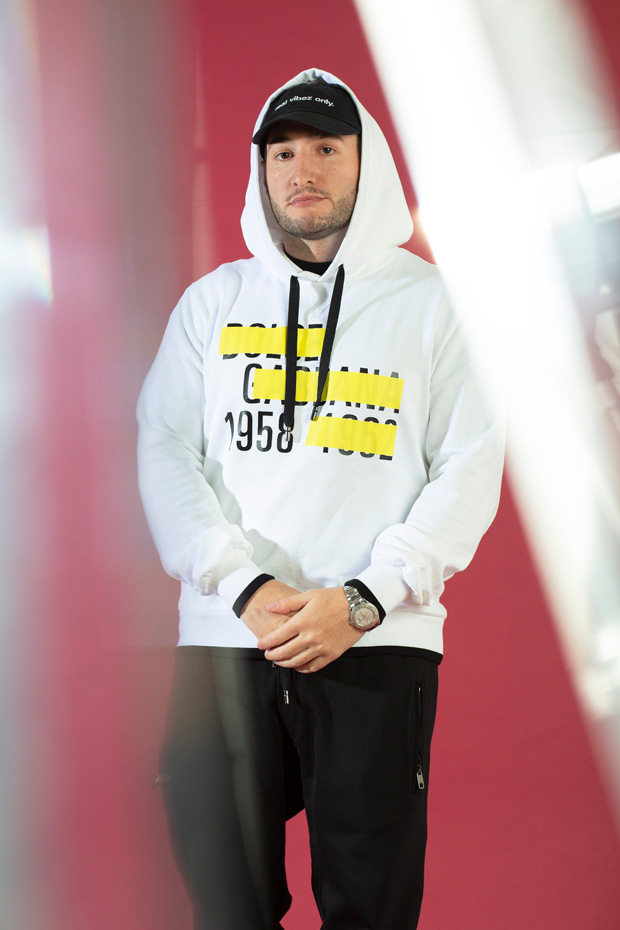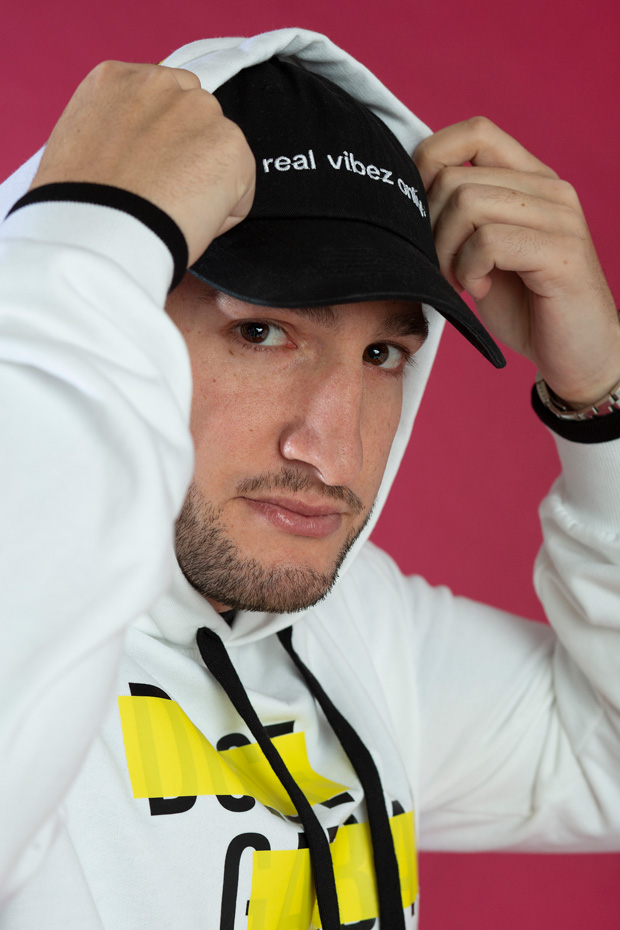
If there’s a word to describe Josh Stone, it will likely be a synonym of “confident.” The former hockey player turned rapper/songwriter/producer walks and talks with self-confidence, with the air of a man who’s comfortable in his own skin. He knows who he is, what he wants to be, and what he wants to do next – and what’s next is his debut album. The rapper put out a handful of tracks in 2019 – “What They Talking Bout,” “Get Gone,” “Said That I Couldn’t,” – before dropping “Raised To Be A Winner” earlier this year. The timing is right for Josh to plant his flag in the hip-hop landscape and carve his own niche.
“It’s more like a full body of work,” Josh says of his album, currently titled Therapy Sessions, when talking EXCLUSIVELY with HollywoodLife. Citing some rap classics as influences – from The Blueprint to Ready To Die to Get Rich Or Die Tryin’ – Josh looks to eschew the current flavors dominating hip-hop for a more classic sound. “I feel like in today’s music generation, everybody’s copying trends. They’re copying fads, and they’re not sticking to being authentic of who they really are, because it’s what they think people want to see.”
Authenticity is important to Josh. It comes up in our conversation, as does his lawsuit with Ariana Grande. Earlier in January, he sued her, alleging that she copied the chorus and hooks from his “You Need I Got It” for her massive hit, “7 Rings.” Josh alleges that producer Thomas Lee Brown – a co-defendant who worked with Ariana on all five of her studio albums – was in attendance for meetings Josh had with Universal Music Group exes in 2017 where he played his song, per Billboard. Reps for Ariana did not respond to HollywoodLife‘s request for comment at the time of publishing.
Along with this, Josh spoke with HollywoodLife about his music, how he connected with Public Enemy’s Chuck D, and what fans can expect when he drops Therapy Sessions.
HollywoodLife: Let’s talk about your song, “Raised To Be A Winner.” How did the collaboration with Maino come about? And what’s next?
Josh Stone: “Raise To Be A Winner” is about hustling hard, family, just different movements. We’re from New York and we really vibed with each other. I previously did production for Maino a couple of years back, he heard the record and he said that ‘this will fit perfectly. I want to jump on this record.’ It was just very organic.
What’s next? Because you haven’t released a full album, right?
Only six singles. An album’s coming out called Therapy Sessions.
I could say that there are some surprise features on it. I’ll also say during this whole Ariana Grande situation, it was really me going into the studio and creating the best body of work possible, putting everything into it. And it was really my therapy. That’s why it’s called Therapy Sessions, cause I wasn’t able to really talk about the Ariana Grande situation for multiple reasons, NDAs, the way we were trying to reach out to them amicably. I like the music to speak for itself, but March, April, that’s when the album should drop.

With a title like Therapy Sessions, it automatically sounds like you’re getting personal on this record. Do you open up – and are there any lines that made you step back and go, ‘damn, this is hot.'”
I feel like on an album, if I felt lines for each song that they should always be a song for everybody on a body of art. I feel like in today’s music generation, everybody’s copying trends. They’re copying fads, and they’re not sticking to being authentic of who they really are, because it’s what they think people want to see — whether that’s face tattoos, whether that’s a certain type of sound. So, in regards to me creating music or having a [major] line, it just really depends on which record you’re listening to, which resonates with you.
Everyone has their own can of Pringles that they like. And that’s how I really look at music. It’s like okay ‘you got 12 records, there’s 12 different flavors,’ but you should be able to relate to at least all of them, whichever mood you’re in.
When you were making Therapy Sessions, were you looking to make a cohesive album, or did you approach this project as if you were making a collection of 12 singles? Or a mixture of both — someone can listen to it from start to finish and have a thorough connection, or is it more of banger after banger after banger?
It’s more like a full body of work, but my influences on it were really like, Biggie’s Ready To Die, Jay-Z’s The Blueprint, 50 Cent’s Get Rich or Die Tryin’, Eminem’s Marshall Mathers LP, and Dr. Dre’s The Chronic. If you combined all those and really see how those albums flow. Like I said, I let the music speak for itself. Everything on those albums are bangers. It’s just what kind of mood you’re in. Sonically, I was really trying to just create a body of work that I believe people will be able to not only relate to, but if they’re in the mood to party, they have a party record like, “In da Club” with them.
But then you got “Patiently Waiting,” which is a whole different [vibe] — you know what I mean? It’s just whatever vibe that they’re on. But I definitely was looking to create the sonic body of work, cause I feel artists are just not putting out bodies of work. They’re putting out singles and six months later they’re working at 7-Eleven. Just saying.
How did you connect with the man you credit as one of your mentions, Public Enemy’s Chuck D?
It was interesting. I was supposed to be one of the top draft picks in the 2008 NHL draft. I ended up getting hurt. Literally three days after my career-ending surgery, my boy called me and he said, ‘Yo, Puffy [Sean “Diddy” Combs] is around the corner.’ Puffy is around the corner from where I was rehabbing, where I kind of grew up my life and long Island — very like white, Greek, Italian, like you would think, ‘why would they be there?’
I go around the block and I met people that worked with [Legendary hip-hop executive] Chris Lighty, God bless the dead and Chris Lighty, 50s manager at the time. He gave me an opportunity to work with DJ Whoo Kid to go take a trip with him to Toronto. And from there we just really started kicking it. So, when I got back from Toronto, my father said to me, ‘What are you trying to do with this music? I know Chucky D.’ I said, ‘Chucky D, like Chuck D from Public Enemy?’ And he’s like, ‘Yeah. I gave him his start of his career. I gave him his first show.” I said, “What are you talking about?’ He’s like, “I’m going to send them an email to Public Enemy’s website. After not talking to him for 25 years, he’s going to answer me back. Watch.” I go, “All right, whatever you say.”
Literally, not even 30 minutes later, Chuck was like, ‘Of course I can never forget you. You gave me my first opportunity.’
Back when rock was changing to rap, that whole scene like 79-80, when Chuck went to Adelphi [University on Long Island]m he used to work for my father, like his promoter. One night, my father’s act didn’t show up and Chuck was like, ‘Let me onstage, let me onstage, let me onstage.’ My father was like, f-ck it. Go onstage. So, you never really forget someone like that.
I’ve learned that story through Chuck and through my father. What he basically said was ‘meet me at the diner’ on Hempstead in Merrick, and I’ll sit and meet with your son and see if he really wants to do this. I went and met with him, literally a day later. All of a sudden there’s a legend sitting at the diner. I walk in, and I’ll never forget this, and he said, ‘I’m going to tell you what I told Tupac and Ice Cube. I’m not going to sit here if you’re not going to write down everything I’m about to say, because the wisdom that I’m about to give you, nobody in the industry is going to give you and keep it 100% authentic with you.’ For that, I’m always grateful and blessed with Chuck. And as we got to know each other throughout those six hours that he just decided from publishing splits to explaining how the game really works.
He gave me the opportunity for the first two years where I was really learning how to make beats, mix, and master, to do it outside of his mom’s house where he lived in Roosevelt. When he was telling me, ‘I only let my friends use the studio,’ you’re talking about guys like Slick Rick, like his friends. I’m not thinking that at the time, you know what I mean? Johnny Juice from The Bomb Squad. Chuck told me, ‘If you have your hands on the board, you’re always going to be necessary, no matter what it is.’ That was the first thing, mixing and mastering and really learning how write songs. I’m just always grateful for Chuck for being able to always be that mentor.
When 2015 came around, he said to me, ‘Listen, I know you’re making these other artists hot production-wise, but this is taking to a turn where it’s all going to be about your shows and your brand. You need to be like the white Kanye with the Jay-Z business sense and make a company’ — which is now Real Vibez Only – ‘and focus on that. Focus on you as the artist and you as the brand, because that’s the show money, and that’s how the industry is turning.’ So, I’m always grateful and appreciative of Chuck’s time, even if it’s three seconds, 10 seconds, and all of his wisdom that he’s given me.

Speaking of the game, you’re pretty hands-on with all aspects of your career – be it inside the studio or in the office. Is that something you learned from him, or have you always been the type of the person who wants to be in the driver’s seat with your career?
It’s interesting that you asked me that because I played the background role for so many A-list artists, whether that was A&R, assisting A&R, or producing. I never really wanted to be the one that was in the spotlight. And so, Chuck told me, ‘Listen, this is where the majority of your monetization are coming from. People aren’t paying X amount for beats anymore. Those days are done. You need to really make a brand.” Now that I’m hands-on with everything, I just think it’s all about your team. The product’s there, I like overseeing everything, but it’s very stressful. But if it was easy, then everybody could do it. So, it’s a blessing and a curse.
There are artists who have expressed a similar sentiment, that the stress of being independent comes with the joy of being in complete control. Would you ever consider partnering with a major?
The one thing also that Chuck said is creative control. Right now, we look to keep creative control. We have two or three deals right now that are on the table, but due, because of the publishing situation and what’s going on with Arianna, it’s stopping me from taking those deals. In the meantime, we’re just going to be doing shows creating leverage. Because at the end of the day, you can stay, quote-unquote, independent, but anybody successful, independent, even — R.I.P. to Nipsey — he had Atlantic records pushing his stuff. So, you always need that machine behind you where hopefully, I could bring up, or I will bring up my own team and my own crew that can then meet whether it’s Interscope, whatever the situation ends up being. Everybody could work together, and that’s how you really build that brand.
As we wrap up, you’ve mentioned your ongoing issue with Ariana Grande over the lawsuit for alleged copyright infringement with “7 Rings.” Is there more you’d like to say about that?
Just that this is a reoccurring theme in the industry, where a smaller producer that’s unknown gets their stuff jacked or gets their stuff stolen, and they’re scared to say something. This is about stolen art at the end of the day. And, I’ll just leave it at that. Like all of my lawyers, everything’s in the lawsuit, but the musicology reports really spell it out. This is black and white. If you have ears, you can hear it. I’ll leave it at that.


